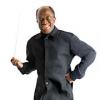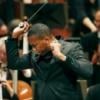
Oakland Symphony Music Director Michael Morgan, 63, who died August 20, was a beloved figure both in the San Francisco Bay Area and the global music community.
While continuing his many activities, Morgan had dialysis treatment and spent seven years on the kidney donor waiting list. In May, 2021, he underwent a successful kidney transplant, but three months later he developed a serious infection which required hospitalization and he was admitted to the Kaiser ICU, where he died later.
Oakland Symphony’s Executive Director Mieko Hatano released this statement:
This is a terribly sad moment for everyone in the Oakland Symphony family. We have lost our guiding father. Michael’s plans and ambitions were set for several seasons to come. He made his Orchestra socially authentic, demanded equality, and he made his Orchestra our orchestra. He fashioned a unique, informed artistic profile that attracted one of the most diverse audiences in the nation. His music reflected his beliefs: reverence for the past, attuned to the future, rooted in his adopted home of Oakland. His spirit will always guide the enduring future of the Oakland Symphony.”
Besides his position with the Oakland Symphony for 30 years, Morgan also served as artistic director of the Oakland Youth Orchestra, music director of the Sacramento Philharmonic Orchestra, and artistic director of Festival Opera in Walnut Creek. He taught a graduate conducting course at the SF Conservatory of Music, and previously taught conducting at the Tanglewood Music Center and conducting workshops around the country.
Morgan created and managed adventurous, often daring programming for his concerts, saying that
I think that everyone should be shooting for the widest possible range of things that a symphony orchestra can credibly do. And the members of the symphony orchestra can do all those things; you just have to see how far you can expand your audience — you don’t want to leave your audience behind, either.
And, if you notice, the [Oakland Symphony] never does anything called a “pops concert,” partly because our community is so diverse that it’s very difficult to define what exactly would go on a pops concert in the East Bay. And then also because a lot of things that other people might relegate to a pops concert, we pull into our main stage series and play alongside the classics from the canon.

As a pianist, Morgan has appeared on the Chamber Music Alive series in Sacramento as well as at appearances in the Bay Area. He served as guest conductor with the New York Philharmonic, New York City Opera, St. Louis Opera Theater, the San Francisco Symphony, San Francisco Ballet, and Washington National Opera, among others.
Morgan was born and raised in Washington, D.C., where he attended public schools. A member of the D.C. Youth Orchestra, at age 12, he began conducting the student orchestra at MacFarland Middle School in Washington. He attended the Oberlin College Conservatory of Music, spent a summer at Tanglewood, where he was a student of Gunther Schuller and Seiji Ozawa, and meeting Leonard Bernstein for the first time, who became an important supporter of his development and career.
In 1980, at age 23, Morgan won first prize in the Hans Swarovsky International Conductors Competition in Vienna, Austria and became assistant conductor of the Saint Louis Symphony Orchestra, under Leonard Slatkin.
His operatic debut was at age 25 at the Vienna State Opera in Mozart’s The Abduction from the Seraglio. In 1986, Georg Solti chose Morgan to become the assistant conductor of the Chicago Symphony Orchestra, a position he held for five years under both Solti and Daniel Barenboim.
In 1990, he became music director of the Oakland East Bay Symphony (the once-and-future Oakland Symphony), where he earned acclaim and community support, along with controversy when he wanted to engage Nation of Islam leader Louis Farrakhan as soloist in the Mendelssohn Violin Concerto.
In 2005, he was honored by the San Francisco Chapter of The Recording Academy with the 2005 Governors’ Award for Community Service. At the same time, the American Society of Composers, Authors and Publishers (ASCAP) chose Morgan as one of its five 2005 Concert Music Award recipients. ASCAP further honored Oakland East Bay Symphony in 2006 with its Award for Adventurous Programming. The San Francisco Foundation recognized him with one of its Community Leadership Awards and he received an Honorary Doctorate from Holy Names University.

Morgan rarely spoke of his personal life, but when he guest conducted the Atlanta Symphony, he spoke at length of the triple challenge of “being a classical musician, being black, being gay... all of these things put you on the outside, and each one puts you a little further out than the last one, so you get accustomed to constructing your own world because there are not a lot of clear paths to follow and not a lot of people that are just like you.”
He also acknowledged the challenge to managers and patrons to give him important positions: “An orchestra being a nonprofit has to raise money, and there’s just some places where it does not need — as the face that represents it — to be black or gay. Even though large parts of the arts community would be very accepting, large parts of the general community might not be as accepting, and you just can’t do anything that suppresses the organization’s ability to raise money.
“I know enough about the history of both black and gay conductors that I don’t really think about myself as a pioneer,” Morgan said, commenting also on his advocacy for new music and bringing new audiences to the concert hall: “I’ve been in the field now for 40-plus years and classical music has been dying the whole time, according to some people. People have been talking about the graying audience for 40 years, but the graying audience keeps replicating itself. You always want to look around and see who’s not in the room and ask how do you get them there.”
Michael Morgan is survived by his mother Mabel Morgan, and sister Jacquelyn Morgan. A memorial service will be announced in the near future.




